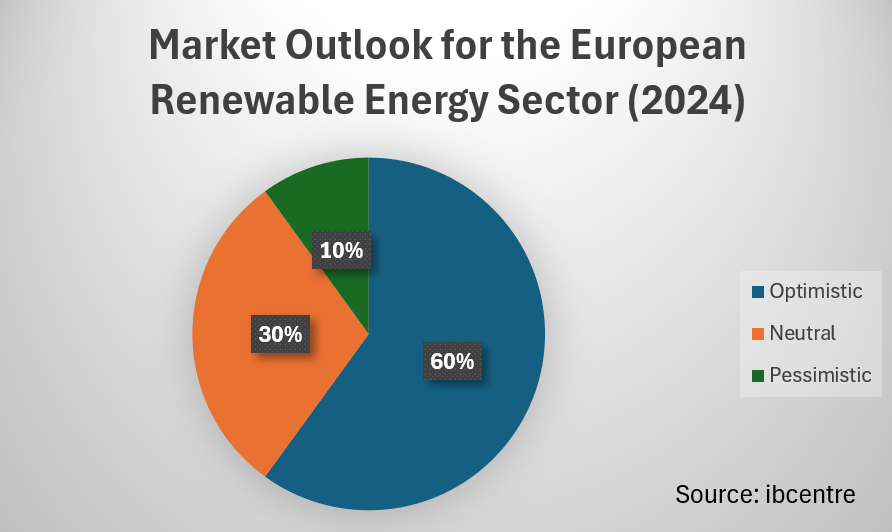Future Outlook and Challenges in the European Renewable Energy Market (survey)

Introduction
The European renewable energy market is at a pivotal juncture, with significant growth opportunities alongside considerable challenges. To gain insights into the current sentiment within the industry, a recent survey was conducted by ibcentre among key stakeholders (200+ respondents). The survey aimed to assess their outlook on the market's future, identify major challenges, and gather perspectives on promising technologies, the impact of geopolitical tensions, and essential policy actions.
Survey Findings and Analysis
1. Market Outlook: A majority of respondents expressed optimism about the growth of the renewable energy market in Europe over the next five years. Specifically, 60% of participants were "Optimistic," while 30% maintained a "Neutral" stance, and 10% were "Pessimistic." This positive outlook suggests a strong belief in the market's potential for expansion, driven by ongoing technological advancements and supportive policy frameworks.
2. Major Challenges: When asked to identify the most significant challenges facing the renewable energy market in Europe, the following issues emerged as top concerns:
- Regulatory Uncertainty: Selected by 45% of respondents, regulatory uncertainty is seen as a major hindrance to the sector's growth. Unclear or shifting policies can create a challenging environment for investment and long-term planning.
- Financing and Investment: Highlighted by 40% of respondents, securing adequate financing remains a critical barrier, particularly in scaling up new projects and innovations.
- Supply Chain Disruptions: 35% of participants pointed to supply chain issues as a significant challenge, likely exacerbated by global events such as the COVID-19 pandemic and ongoing geopolitical tensions.
- Grid Integration and Energy Storage: 30% cited challenges related to grid integration and the need for advanced energy storage solutions as key obstacles to achieving greater penetration of renewables.
These findings underscore the complexity of the market, where multiple interrelated factors can impede progress. Addressing these challenges will require coordinated efforts from policymakers, industry leaders, and investors.
3. Promising Technologies and Innovations: Respondents were also asked to identify the most promising technologies or innovations that could accelerate the growth of renewable energy in Europe. The top responses were:
- Advanced Energy Storage Solutions: Cited by 40% of participants, advancements in energy storage are seen as crucial for managing the intermittency of renewable energy sources and ensuring grid stability.
- Solar PV Advancements: 30% of respondents believe that further innovations in solar photovoltaic technology will drive significant growth in the sector.
- Hydrogen Technology: 25% highlighted hydrogen as a key enabler of a low-carbon economy, with potential applications across various sectors, including transportation and industry.
- Digitalization and Smart Grids: 20% of respondents see digitalization and the deployment of smart grid technologies as essential for optimizing energy distribution and enhancing efficiency.
These insights reflect a broad consensus on the importance of technological innovation in overcoming current limitations and unlocking the full potential of renewable energy.
4. Geopolitical Impact: Geopolitical tensions were perceived to have varying degrees of impact on the renewable energy market in Europe:
- Moderate Negative Impact: 50% of respondents believe that current geopolitical tensions are having a moderate negative impact on the market. This may be due to disruptions in supply chains, increased uncertainty, and the potential for rising costs.
- Major Negative Impact: 25% of participants view the impact as major, likely reflecting concerns over energy security and the stability of international partnerships.
- Little to No Impact: Interestingly, 25% of respondents felt that geopolitical tensions had little to no impact, possibly indicating confidence in the market's resilience and the diversification of supply sources.
These responses highlight the need for the European renewable energy sector to bolster its resilience against external shocks and geopolitical risks.
5. Key Policy Recommendations: To support the continued growth of the renewable energy sector, respondents identified the following policy actions as most beneficial:
- Increasing Subsidies or Incentives: 40% of respondents believe that enhanced financial support for renewable energy projects, including subsidies and tax incentives, would significantly boost the sector.
- Streamlining Permitting Processes: Another 40% emphasized the need for more efficient and streamlined permitting processes to accelerate project development and reduce bureaucratic delays.
- Enhancing Grid Infrastructure Investments: 20% of participants called for increased investment in grid infrastructure, which is critical for integrating higher levels of renewable energy and improving grid reliability.
These policy recommendations align with the identified challenges and suggest a clear roadmap for policymakers to support the sector's growth.
Conclusion
The survey results paint a picture of a European renewable energy market that is poised for growth but faces significant challenges that must be addressed to unlock its full potential. Optimism about the market's future is tempered by concerns about regulatory uncertainty, financing, and supply chain disruptions. However, with the right technological innovations and supportive policy frameworks, the sector is well-positioned to overcome these hurdles and drive Europe toward a more sustainable energy future.
The industry’s collective focus on advanced energy storage, solar PV advancements, and hydrogen technology reflects a forward-looking approach that will be crucial in navigating the complexities of the market. As geopolitical tensions and other external factors continue to shape the landscape, resilience and adaptability will be key to sustaining progress.
Overall, the survey highlights the critical role of strategic policy interventions and continued innovation in ensuring the successful transition to a renewable energy-driven economy in Europe.

